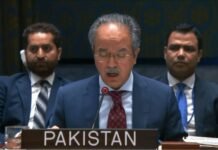Davos, 26 May 2022 (TDI): The Foreign Minister of Pakistan, Bilawal Bhutto Zardari, met Austrian Foreign Minister Alexander Schallenberg at Davos’s World Economic Forum.
FM @BBhuttoZardari met his Austrian counterpart @a_schallenberg on sidelines of #WEF22.
➖FM underscored that #Pakistan valued its relations with #Austria, both bilaterally as well as a key member of #EU.
🇵🇰🤝🇦🇹 pic.twitter.com/HnzxTxVtlf
— Spokesperson 🇵🇰 MoFA (@ForeignOfficePk) May 25, 2022
Discussions between the Foreign Ministers
The meeting between the two Foreign Ministers took place on the sidelines of the WEF. Thus, the Pakistani Foreign Minister underlined that Pakistan valued its relations with Austria.
Foreign Minister Zardari highlighted that they reviewed bilateral cooperation, particularly in trade, education, tourism, science, and technology.
In addition to this, he further invited more Austrian companies to invest in Pakistan.
Glad to meet @a_schallenberg on sidelines of #WEF22.
Reviewed bilateral coop esp in trade, education, tourism & science & tech.
Invited more austrian companies to invest in 🇵🇰.#Pakistan accords high imp to #Austria bilaterally, as an EU member & as a development partner. pic.twitter.com/kvvEY1zpnf
— BilawalBhuttoZardari (@BBhuttoZardari) May 25, 2022
History and relations between Pakistan and Austria
Pakistan and Austria established diplomatic relations in 1956 when Pakistan formally acknowledged Austria.
Part of Austria and Pakistan’s friendly and constructive relationship includes some Austrians that have played a significant part in Pakistan’s history. For instance, Leopold Weiss who was born in Austria, moved to Pakistan, converted to Islam, and changed his name to Muhammad Assad.
Following this, he contributed significantly to the drafting process of the Pakistani constitution. As a result, he was the first Permanent Representative of Pakistan to the United Nations.
Both countries are also unified by their topography, that is, being mountainous and housing some of the world’s most impressive landscapes.
Moreover, serving as a successful example of scientific cooperation is the Pak-Austria University of Applied Sciences in Haripur.
Which is a collaboration involving the provincial government of Khyber Pakhtunkhwa, several Austrian (FH Joanneum Graz, MCI Innsbruck, JKU Linz), and Chinese universities.
During the tenure of former Prime Minister Khan, the institute was opened on the 17th of September 2020.
As a result, 250 students started their studies in October 2020 and in 2021 the number of students increased to approximately 600.
Above all, the tenet of the university is bringing professors from Austria to Pakistan and training the teaching staff.
In conclusion, with regards to state treaties and government agreements, both countries signed several Memoranda of Understanding (MoU).








